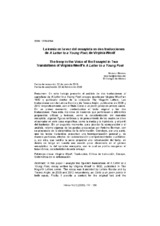La ironía en la voz del ensayista en dos traducciones de A Letter to a Young Poet, de Virginia Woolf
The Irony in the Voice of the Essayist in Two Translations of Virginia Woolf’s A Letter to a Young Poet
Autor
Bernal, Nathaly
Editor
UCOPressFecha
2020Materia
Woolf, Virginia, 1882-1941Traducción
Crítica de traducción
Ensayo
Sistemática de la deformación
Translation
Translation criticism
Essay
System of textual deformation
METS:
Mostrar el registro METSPREMIS:
Mostrar el registro PREMISMetadatos
Mostrar el registro completo del ítemResumen
En este trabajo presento el análisis de dos traducciones al castellano de A Letter to a Young Poet, ensayo escrito por Virginia Woolf en 1932 y publicado dentro de la colección The Hogarth Letters. Las traducciones son de Leticia García y de Teresa Arijón, publicadas en 2008 y 2012 respectivamente, con el título Carta a un joven poeta en ambos casos. En un primer momento, contextualizo el texto original y las dos traducciones. Para esto, me sirvo de nociones que pertenecen a diferentes propuestas críticas y teóricas, como la caracterización del narrador ensayista, algunas figuras retóricas y de pensamiento de las cuales se sirve el narrador en este caso específico, como la ironía y la hipérbole, y el perfil del traductor. En un segundo momento, para abordar la comparación y el análisis, retomo algunas de las pautas propuestas por Antoine Berman, con su propuesta de la sistemática de la deformación. Concluyo, por una parte, que los textos traducidos presentan una homogenización general y, de manera particular, efectos de racionalización y empobrecimiento cualitativo; y, por otra, que valdría la pena proponer una retraducción del texto, en donde se tenga en cuenta una noción poco observada en el género ensayístico: la del narrador ensayista, con lo cual se podría recuperar el tono irónico, característico de este ensayo. In this paper I analyze two Spanish translations of A Letter to a Young Poet, essay written by Virginia Woolf in 1932, published in The Hogarth Letters series. The essay was translated by Leticia García and by Teresa Arijón, in 2008 and 2012 respectively, as Carta a un joven poeta in both cases. Firstly, I provide a context for the original text and the translations. For this purpose, I draw on concepts that belong to different critical and theoretical proposals, such as the characterization of the narrative voice of the essay, some figures of speech like irony and hyperbole, and translator’s profile. Secondly, in order to address the comparison and the analysis, I take into consideration some tenets by Berman, related to his proposal of the system of textual deformation. I conclude, on the one hand, that the translated texts have undergone a process of homogenization, and, to a lesser extent, processes of rationalization and qualitative impoverishment; on the other hand, that it is worth suggesting the need of retranslating this essay, so that the translator could observe an issue that has so far received little discussion: the notion of the narrative voice in the essay, whereby the ironic tone, which is characteristic of the original text, could be reestablished.

